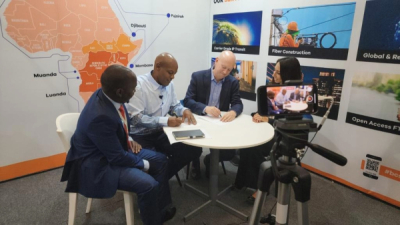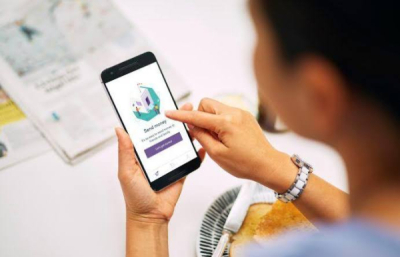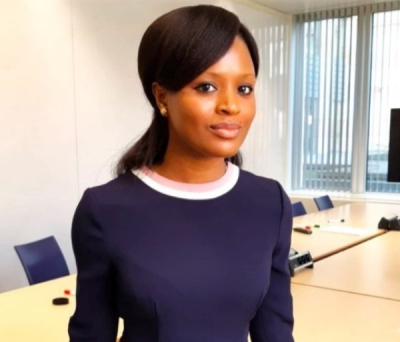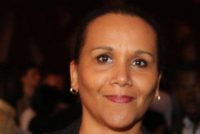The physician has nearly 20 years of clinical experience in HIV/TB and 10 years of experience in the healthtech segment. The healthtech startup he founded provides effective and much-needed digital health solutions to “support self-care and provide access to services.”
Musaed Abrahams is a South African health professional and the founder/CEO of Aviro Health, a healthtech startup founded to improve access to quality healthcare in Africa.
“My goal is to create healthcare impact through technology by focusing on empathy, great design, and data,” his Linkedin profile reads.
His healthtech startup offers tech solutions that automate workflows, therefore allowing healthcare professionals to focus on important tasks. It also improves access to health information and provides digital consulting services. Currently, it claims more than 50,000 patients helped in South Africa and Kenya.
The startup developed Aviro Pocket Clinic to allow healthcare providers to easily and quickly perform digital HIV, tuberculosis, and diabetes checks. It also allows individuals to privatively perform those checks and access specialists and services for support when needed.
Its CEO holds a Bachelor of Medicine and Surgery (MBChB) obtained at the University of Cape Town in 2001. In 2010, he got an HIV management diploma from the Health Professions Council of South Africa. He also took part in the Harvard Business School’s Healthcare management program.
His professional career began in 2005 as a senior physician at the ARV Clinic in South Africa. He joined Médecin Sans Frontière (MSF) in 2008 as the HIV training coordinator in South Africa. Then, from 2013 to 2015, he worked as the organization's digital content producer and editor, contributing to the creation of the eighth edition of the MSF HIV/TB guide.
Currently, he is the deputy president of MSF's Southern Africa board. Between 2016 and 2017, he was a senior business development consultant for the health technology company Praekelt.org.
Let’s note that his startup, Aviro Health, was among the top 45 of the most innovative startups at the AfricaTech Awards 2022. It is also a beneficiary of the pan-African innovation program Investing in Innovation.
Melchior Koba
Though they are not yet popular like fintech and healthtech solutions, insuretech tools are garnering a fair share of attention in Africa. In Rwanda, a tech entrepreneur has developed a solution to allow access to decent healthcare for corporate employees.
Eden Care is a digital platform developed by a Rwandan eponymous start-up. It helps users subscribe to health insurance without even passing through insurance brokers.
"Eden Care was founded to create the kind of health insurance we wanted for ourselves – one that is affordable and doesn’t require filling six pages of documents at the hospital and a three-hour wait time. One where we can easily see our benefits and provides wellness tools, community, and incentives to enable us to get and stay healthy,” explains Moses Mukundi, CEO and founder of Eden Care.
The solution offers customizable and affordable health plans allowing firms to subscribe to plans based on the number of their employees. It boasts an extensive network of providers for good national coverage. If necessary, it resorts to telehealth.
It significantly reduces the paperwork with faster pre-authorizations and also reduced reimbursement times for medical providers.
"We see Eden Care as having what it takes to deliver that increase in value and service for consumers. […]By digitizing insurance processes and providing a wellness-first insurance cover to employers, Eden Care is making quality health insurance accessible to an underserved market – growing SMEs and businesses,” says Arnold Mwangi, partner at the Dutch impact investment firm DOB Equity, which contributed to the healthtech startup’s recent pre-seed round.
Adoni Conrad Quenum
Digital tools are currently considered essential technologies for Africa's post-Covid-19 recovery and even its future growth. However, unequal access to the internet may become a challenge to countries’ efforts.
Last Thursday, the European Investment Bank (EIB) announced US$10 million in support as part of its cooperation with telecom infrastructure company the Bandwidth & Cloud Services Group (BCS Group).
The investment aims to bring transformed digital connectivity to more than 2.5 million people living in remote areas of the eastern Democratic Republic of Congo through a fiber optic network built by BCS.
"The European Investment Bank is committed to accelerating digitalization across Africa and is pleased to strengthen our partnership with BCS to transform high-speed fibre optic networks in the DRC. Expansion of the fibre optic backbone will enable local communities to benefit from mobile broadband and hospitals and schools to be connected to the rest of the world,” said EIB Vice-president Thomas Östros.
According to the Global System Operators' Association (GSMA) report "The State of Mobile Internet Connectivity 2020, "DRC is one of the African countries that have the largest connectivity gap between urban and rural areas. Its demand for connectivity has grown significantly after the coronavirus pandemic, encouraging international companies to invest in the country. Liquid Technologies, Facebook, and CSquared have committed to building fiber optic networks in the country to improve access to affordable broadband internet.
The new BCS investment, supported by the EIB, will connect areas currently underserved by broadband telecommunications. The support will fund the construction of 1,200 kilometers of fiber out of the 20,000 kilometers planned by BCS in Southern, Central, and Eastern Africa over the next 3 years.
Several outcomes are expected at the end of the project. According to the EIB release, "better digitalization will unlock new opportunities for local entrepreneurs and support job creation, and direct telecom connections to 319 schools and 70 hospitals and health centers to improve education and public health."
Samira Njoya
The Ivorian government is multiplying digital initiatives to boost young people and women’s employability, promote innovation and reduce unemployment.
In Côte d’Ivoire, Communication Minister Amadou Coulibaly (photo, right), and Minister of Trade Souleymane Diarrassouba (photo, left) launched the Employment4Youth program last Thursday.
The program’s full name is "Employment4Youth / Industry 4.0 to promote youth employment in Tunisia and Côte d'Ivoire. It was launched in collaboration with the United Nations Industrial Development Organization (UNIDO) with financial support from the German Federal Ministry for Economic Cooperation and Development (BMZ). It aims to support and strengthen stakeholders’ capacity in the ICT and agribusiness sectors to ease access to the opportunities presented by the fourth industrial revolution as well as create jobs for women and the youth with the adoption of new technologies in targeted value chains.
"Our country wants to ensure that the digital economy is a growth sector by creating jobs for the youth and promoting investments,” said Amadou Coulibaly, before stressing that the government's goal is to make Côte d’Ivoire a fully digitized country by 2030. Last September 26, the country set up a National Digitalization Committee, that will, among other things, elaborate a framework governing digitization efforts for an effective digital transformation.
In 2011, the Ivorian government initiated several digital reforms including the adoption of the National Digital Strategy. The strategy is focused on seven pillars. It suggests 32 reforms and 96 projects requiring a XOF2,000 billion (US$3.15 billion) investment to be implemented over 2021-2025.
According to Amadou Coulibaly, the Employment4Youth program is part of this strategy. It is also in line with the structural transformation promoted by the president of the republic to make digital transformation an effective solution to youth employability. The initiative will be based on Industry 4.0 or the industry of the future which uses artificial intelligence, big data, digital technologies, blockchain, e-commerce, etc. It will create 13,000 jobs (3,000 direct jobs) by 2025 in the private sector (social and ecological transformation, renewable energy, ICT, agribusiness, etc.). The estimated investment required is US$30 million.
Samira Njoya
It is sometimes challenging to send money to relatives in Africa because of the high fees charged by transfer companies. The situation has improved in recent years, with tech entrepreneurs developing innovative solutions to address the issue.
Yalla Xash is a fintech solution developed by a Moroccan eponymous startup. It allows users to quickly send money to Canada, Senegal, and Côte d’Ivoire, via its mobile app.
Using its mobile app -Android and iOS apps, registered users can send funds, which will be available for withdrawals in cash within 30 seconds. For bank transfers, it takes a max of 48 hours to clear.
The startup claims its withdrawal fees, which start from CAD1.99 (US$1.5), are up to six times lower than the competition. It always sends SMSs to notify recipients of incoming transactions and the details of the specific transactions. Also, once the funds sent are withdrawn it sends SMSs to senders informing them of the successful withdrawal.
Currently, PlayStore data shows its Android app has been downloaded more than 5,000 times. After the Covid-19 pandemic, it recorded a 35% rise in transaction volume and is steadily gaining ground in Africa. It has over 4,300 pickup points in Morocco. In June 2021, it announced the raise of MAD6 million (US$560,000) from the Maroc Numeric Fund, which was seduced by its solution and social impact.
Adoni Conrad Quenum
She is a lawyer with more than 10 years of experience working for Belgian law firms. Recognizing how difficult it is for residents to access legal information in Senegal and Africa in general, she decided to create a digital database of African laws.
Nafissatou Tine (photo) is a Senegalese lawyer and entrepreneur. She is the founder and CEO of Sunulex, a start-up that digitizes legal documents to facilitate certain procedures for the African and Senegalese diaspora.
Sunulex has two legal platforms. The first -Sunulex.sn- was created in 2016 to solve access to legal information and practitioners' challenges in Senegal. It is the reference legal platform in Senegal, listing Senegalese, OHADA, WAEMU, and ECOWAS legal texts and court decisions proclaimed by the Senegalese supreme court and the OHADA Common Court of Justice and Arbitration.
"I launched the Sunulex.sn legal platform in Senegal to provide online and organized access to Senegalese legislation for legal practitioners and citizens," she said in 2019.
The second platform is Sunulex Africa, which is an online database of African laws. It gives legal professionals access to the resources they need to advise, defend and enforce the right laws. Sunulex, which was created in 2020, contains over 70,000 official documents covering 15 French-speaking African countries and 8 regional economic zones.
Its originator graduated from the University of Tours with a master's degree in French private law in 2007 and from the Free University of Brussels with a master's degree in Belgian law in 2010 and a complementary master's degree in social law, labor law, and social security in 2011. In 2016, she also got a certificate in public management from the University of Wisconsin-Madison.
She started her professional career, in 2005, as an intern with the Senegalese human rights NGO RADDHO. In 2007, she joined Human Rights Watch as an intern, in Belgium. The following year, still in Belgium, she started teaching French at Global LT, and, in 2009, she became a federal public service employee at the Brussels Social Inspection Department.
From 2011 to 2012, she was a lawyer at Marx Van Ranst Vermeersch & Partners. She later became the lawyer representing the energy firm VWEW. Concurrently, she was a teaching and research assistant at the Catholic University of Leuven.
In 2014, Reliance Avocats hired her as an attorney, and in 2015 she became a research associate at the Pan African Institute of Strategies in Senegal. From 2017 to 2018, she worked, as a legal adviser, for the IT firm ETNIC. Nafissatou Tine won the 2018 African Diaspora Entrepreneurship Award in Belgium for Sunulex. Currently, she is an attorney at the law firm Sunulex lawyers, in Belgium.
Melchior Koba
Over the past few years, the number of digital solutions developed in Africa has grown significantly. With the ongoing digital transformation, it is poised to rise further but, there is still an urgent need to train the youth to accelerate productive transformation and end unemployment.
Last Wednesday, the National Agency for the Promotion of Employment and Competencies (ANAPEC) and Orange Morocco signed a framework agreement to train young people in digital professions.
The agreement aims to ensure that 1,000 young Moroccans and legal migrants are trained and supervised at Orange Digital Centers and ANAPEC’s MoukawiLab in the framework of a technical and professional support program. The training will take into account the labor demand and entrepreneurial potentials.
According to Minister of Economic Inclusion Younes Sekkouri, it is a promising project that aims to support thousands of young people -graduates and non-graduates alike as well as young persons neither in education nor employment or training- by providing them with intensive training and tailored support to create their businesses and develop their ideas.
In March, Orange opened its 10th African Digital Center in Rabat to boost innovation in Morocco. During the inauguration, it committed to promoting youth employment and entrepreneurship by democratizing access to technologies in the country.
The newly signed agreement lines up with that commitment. It covers the implementation of dedicated programs under the "Orange fiber school" which trains qualified technicians and sales representatives and develops valuable fiber optic technician skills.
The agreement will also allow the two institutions to co-organize roadshows to raise awareness of the training and entrepreneurship opportunities offered by the program and encourage participation in each of the targeted regions.
Samira Njoya
In September 2022, in line with its ambition to conquer Africa, Cellulant signed a partnership with Orange Money, to implement card-to-wallet transfers for eight banks in Botswana.
Pan-African fintech Cellulant Corporation announced, last Tuesday, it had secured a payment systems operator license from the National Bank of Uganda, per the 2020 Act that governs the national payment system.
According to Frances Diribe, Cellulant’s Chief Risk & Compliance Officer, the license marks another evolutionary step for the company founded in 2003. "Uganda currently has over 800,000 registered businesses and a fast-growing digital youthful population. We’re on course to double down our work in offering these businesses and their clients’ dependable payment options. By streamlining the business payment process, they can concentrate on growing themselves," he said.
Mobile and digital payments are gaining momentum across Africa. In its "State of the Industry Report on Mobile Money 2022," the Global System Operators' Association (GSMA) estimates that the continent was home to more than half of the world's active mobile money accounts in 2021. It had 184 million subscribers compared to 161 million the year before. This leads to a fairly high transaction volume (36.7 billion transactions and US$701.4 billion in value), up by 39% year-on-year.
The license allows Cellulant to expand its operations locally and regionally while assuring its business partners of its compliance with local and international security regulations. By partnering with six financial institutions and over 50 merchants in Uganda, Cellulant offers mobile banking and cashiering solutions throughout the country. It claims payment collection and payouts powered to thousands of businesses in 35 African countries.
“Cellulant launched operations in Uganda in 2009 and through its single API payments gateway – Tingg – it enables global, regional and local businesses to collect payments online and offline serving its customers with locally relevant payment methods, including mobile money, cards & banks,” it indicates.
Samira Njoya
In Africa, telecom operators used to shun rural areas, which were deemed not attractive enough. However, with the acceleration of digital transformation, most of them are operating strategic repositioning.
Last Tuesday, Orange -through Orange Côte d'Ivoire- announced a service agreement with tech innovation company Vanu Inc to extend its network coverage in Côte d'Ivoire, Burkina Faso and Liberia. The agreement includes the provision of technology upgrades and will be based on the innovative "Network-as-a-Service" (NaaS) model. It will begin with the rollout of 1,070 sites, including 700 in Côte d'Ivoire, 170 in Burkina Faso and 200 in Liberia.
According to Nafy Coulibaly (photo), Orange's deputy general manager in charge of operations in Côte d'Ivoire, Burkina Faso and Liberia, "Orange will roll out its services by strategically improving/increasing its network coverage so that no one is left behind.”
“Our goal is to provide free and open access to digital services, anywhere and to as many people as possible [...] to make digital services accessible to millions of people in rural areas of Côte d'Ivoire, Burkina Faso and Liberia who were not covered before,” she added.
The partnership between Orange Côte d'Ivoire and Vanu, Inc. is part of Orange's IDEAL program, which aims to extend network coverage in rural areas to 20 million people through the construction of 5,000 sites over four years. Rural areas in Africa, where a large proportion of the population still resides, are poorly covered by telecom networks. Yet, they have high-growth potential.
By strengthening its presence in rural areas, Orange Group is moving to increase its subscriber base, facilitate access to digital services and ultimately become the main operator in the targeted markets.
Muriel Edjo
From Mali, where it has established a strong base, the startup wants to conquer other African countries. It has already taken initial steps in that regard by entering two additional countries.
Sama Money is a fintech solution developed by a Malian eponymous start-up. It allows its users to send money anywhere in Mali at rates 60% cheaper than the competition.
On its website, the fintech startup behind the solution explains that it aims to boost financial inclusion in Africa. For that purpose, it “developed an innovative and accessible system that offers not only very competitive rates but also a multi-channel solution that can be used with or without an Internet connection.” It also offers additional services that can be paid fee-free using the Sama e-wallet”
The solution is accessible via a mobile app, available for Android and iOS devices. Once they sign up with a Sama account, users can access the various services offered, including money transfers and withdrawals, electricity and water bill payments, airtime top-ups, etc.
It is worth noting that several institutions have adopted Sama Money for various payments, including Covid-19 financial assistance, scholarship, insurance, salaries, and pensions. It is also accessible via a USSD code, which allows rural communities with no access to the internet to use its services.
According to PlayStore data, the Android version of its mobile app has already been downloaded more than 100,000 times. This year, the solution was scaled into Côte d’Ivoire and Burundi. It intends to enter more African markets.
Adoni Conrad Quenum
More...
The serial entrepreneur is the mastermind behind several tech solutions. He also developed Africa’s first humanoid robot, becoming one of the continent’s leading innovators.
Chuks Ekwueme (photo) is a Nigerian businessman and CEO of the Uniccon Group of Companies, which he founded in 2020. With the Uniccon Group, he aims to help Africans -both businesses and households- access the most innovative and impactful solutions to realize their full potential.
Uniccon Group specializes in STEM (Science, Technology, Engineering, and Mathematics), software development, e-commerce, agricultural value chain supply, and export logistics. It is also an expert in jewelry and international business consulting and advisory.
In October 2022, at the GITEX trade fair -Dubai, October 10-14, 2022- its CEO unveiled the first humanoid robot it developed, a first in Africa. The robot, baptized Omeife, can converse in several local and international languages including Igbo, French, English, Arabic, and Afrikaans. During his presentation, Chuks explained that the humanoid robot was developed by the Stem Focus Lab -a Uniccon Group of Companies’ project- and completed two days before the GITEX 2022.
Chucks has developed several other solutions such as SmartMedicare, SmartWorks, SmartFree, Payfocuss, and CloudFocus. In April 2022, he launched a US$40 million cybersecurity solution. The solution, called Lossless Security, provides organizations with a full range of cyber protection solutions including endpoint defense, fraud detection, and data transfer encryption.
Since 2009, the serial entrepreneur is the director of Coevis World, a distributor of gypsum-based construction materials in Nigeria. From 2014 to 2016, he worked as the chief technical officer and consultant of Divine Rewardn Services, a supplier of construction chemicals and structural sealant technologies.
In October 2022, he won the Excellence in Technology and Community Development Award at the Peace Achievers International Award.
Melchior Koba
The funding comes almost one year after the U.S.-based international organization awarded initial capital to the three associations working for digital inclusion in Africa.
Last Tuesday, the Internet Society Foundation, the global organization that promotes internet access, granted the third round of grants to promote digital inclusion in Bangladesh, Colombia, and Senegal. The grants provided under the SCILLS (Strengthening Communities, Improving Lives and Livelihoods) program aim to support five innovative projects in the three countries.
"The SCILLS program reflects our commitment to promoting equitable digital transformation through Internet skills development. We are thrilled to renew our support to these five projects that are promoting digital inclusion for communities in Bangladesh, Colombia, and Senegal," said Sarah Armstrong, Executive Director of the Internet Society Foundation.
In Senegal, the foundation will fund two major projects to the tune of about US$400,000. The first, CTIC (Croissance TIC) Dakar, is a growth accelerator that will receive US$249,493 to train 30 early-stage entrepreneurs with high growth potential in entrepreneurial and digital skills and facilitate their access to financing.
The foundation will also fund SENUM (Synergy for Digital and Media Education), an association whose mission is to train and sensitize young people, their parents, and teachers on the educational use of digital technology. The US$149,421 granted to SENUM will be used to train teachers in the use of the Internet to improve the quality of education and help students acquire ICT skills through "tech clubs" and inter-school hackathons.
The SCILLS program, which is currently established in only one African country, will be expanded to Ghana in 2023. This is the second financing provided by the Internet Society Foundation in Senegal under the SCILLS program. In 2021, the foundation funded Association Jeunesse Espoir, the Simplon Foundation, and SENUM to help residents of beneficiary cities acquire digital skills that are essential for academic and economic improvement.
Samira Njoya
The platform aims to develop the Egyptian industrial sector, which grew by 6.5% and contributed 17% to GDP in 2021.
Egypt will soon launch a digital industrial platform. For that purpose, last November 2, the Ministry of Planning and Economic Development, the Ministry of Trade and Industry, and financial service provider E-finance -a subsidiary of eFinance Investment Group- signed a memorandum of cooperation for the development and management of the said platform.
The platform aims to offer investors and manufacturers improved services, accelerate the exploitation process and streamline the required procedures. Using the platform, firms can test the new services before presenting them to their clients.
According to Business Today Egypt, the “platform also offers other services such as cloud platforms, secure infrastructure, internet of things, cybersecurity applications, artificial intelligence, big data, and more.”
Like several African countries, Egypt is betting on digital transformation to accelerate its development. In 2017, the country became an attractive hub for large tech firms, thanks notably to strategic actions taken by the government.
The new platform is therefore one of the government’s actions to accelerate existing digital transformation efforts.
According to the statement announcing the signing, the platform will be launched at the Cairo ICT conference, which will be held on November 27-30, 2022, in collaboration with global digital transformation pioneers such as Pure Storage, Dell, IBM, Cisco, Redhat, Huawei, and many others.
The memorandum of cooperation is part of Egypt's Vision 2030 and its digital transformation strategy, which aims to enhance economic and social development across all sectors and make the country a digital hub of excellence in Africa.
Samira Njoya
Despite public authorities’ efforts, not everyone has access to education in Africa. Tech entrepreneurs are entering the field, leveraging digital solutions to bring education to everyone.
Foondamate is a study chatbot developed by a South African eponymous startup. The chatbot allows users access to online courses. The startup behind the bot was founded, in 2020, to help students access study materials.
"At FoondaMate, we believe talent is equally distributed yet opportunities are not. There are often competing factors that contribute to educational inequality – not just in Africa, but across the world – and our technology is helping to universally address these," said Dacod Magagula, CEO and co-founder of FoondaMate, the startup behind the chatbot.
The chatbot can be accessed on WhatsApp and Facebook Messenger. The bot, which speaks 13 languages (French, English, Sesotho, afrikaans, setswana, etc.), usually asks questions to assess first-time users’ education level. Then, they can assess the education materials and support they want. Among other things, they can download documents and memos, find solutions to maths problems and ask the meaning of words they don’t understand.
The startup claims more than 900,000 users in about 30 countries. "It's humbling to think that so many learners trust us to support their desire to learn, and that's a responsibility we take incredibly seriously," CEO Magagula indicated earlier this year when the startup raised US$2 million to accelerate its expansion.
Adoni Conrad Quenum















